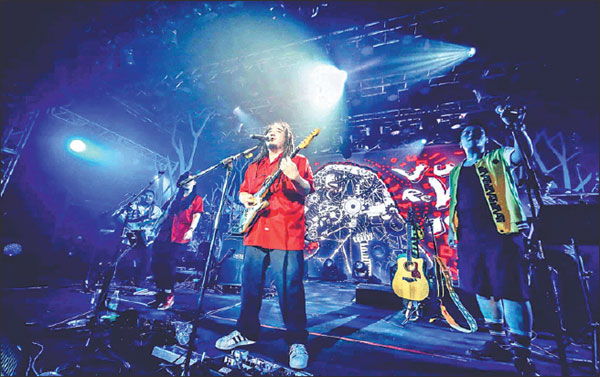Matzka moment
By Chen Nan (China Daily) Updated: 2017-02-16 07:40A man whose reggae is influenced by the music of his ethnic group in Taiwan aspires to charm Beijing. Chen Nan reports.
Matzka's dreadlocks are a nod to both reggae and his upbringing in a Taiwan village.
On Friday, he will give his first show of the year at Blue Note Beijing, the first Chinese branch that opened in August of New York's famous Blue Note Jazz Club.
The 32-year-old singer-songwriter scored big at the Golden Melody Awards in 2011, with his self-titled album.
|
Taiwan singer-songwriter Matzka will entertain Beijing audiences on Friday with a show blending jazz, hip-hop and reggae. Photos Provided to China Daily |
Last year, he toured four cities on the Chinese mainland, including Shanghai, Hangzhou and Guangzhou, in support of his new album, VuVu Reggae, which earned him a nomination for best male singer at the same awards held annually in Taipei.
Along with live-band performers, including Chinese-American guitarist Lawrence Ku, Mauritian bassist Damien Banzigou and Argentine keyboard player Martin "Musa" Musaubach, Matzka will take Friday's audience on a tour of fusion, jazz, hip-hop and reggae.
It'll feature remixed versions of his songs inspired by his ethnic Paiwan ancestry.
"There is a lot of Taiwan's aboriginal music in my sound, which comes from the laid-back nature of the ethnicities there," Matzka tells media in Beijing.
He was raised in a village in Taitung county, which is surrounded by hills and oceans, he adds.
VuVu Reggae reflects a combination of the traditional ethnic music of his hometown, and contemporary reggae and rock. Vu vu in Paiwan language refers to "grandmother", and the album is dedicated to Matzka's grandmother, who sang him old folk songs in childhood.
"My grandmother is very optimistic and open-minded. She encourages me to go on adventures and do something different," Matzka says.
He also deals with some social issues in his songs, such as bullying in schools and youth leaving their hometowns to seek jobs in big cities.
"I didn't pick up the guitar until college so I wouldn't say I was born a musician. But writing songs came naturally to me, because I grew up listening to people sing every day amid the sunshine and barbecue parties," he says.
"When I started to write music, I didn't realize it was reggae. I just felt that the musical style suited me. The tempo is relaxed and sometimes the songs are humorous, things that I enjoy," he says.
In 2010, Matzka founded the band Matzka with a few young people, including drummer Atuhuy, guitarist Sakinu and bassist Alisin from the Paiwan and Puyuma aboriginal groups.
But since 2015, he has been performing solo shows. His storytelling through lyrics and reggae beats have made him popular in Taiwan, where pop music dominates mainstream culture.
Veteran music producer and songwriter Jonathan Lee, who's also from Taiwan, had called Matzka's music "one of the most exciting sounds from Taiwan" after hearing him at an original singer-songwriter's contest in Taipei in 2008.
The song Matzka performed then was Mado Vado, which means "like a dog", and was the first song he had written. It was sung in the Paiwan language and is about elderly people telling the youth about responsibilities.
"I sing in Mandarin and the language of my people. Young people from aboriginal groups in Taiwan consider it out-of-date and boring to sing in their native language. But I like the language," he says.
Even when he sings in Mandarin, he likes doing so in an aboriginal accent, which has become his trademark. "I want to use my music to tell the youth that aboriginal music is cool."
With fame chasing him, Matzka says he needs to take his influence on such groups more seriously.
"There are many young people of our ethnicity who create music. I want to be a good role model for them. I don't want them to simply follow the trend. They should have their own voice."
Contact the writer at chennan@chinadaily.com.cn
- 'Cooperation is complementary'
- Worldwide manhunt nets 50th fugitive
- China-Japan meet seeks cooperation
- Agency ensuring natural gas supply
- Global manhunt sees China catch its 50th fugitive
- Call for 'Red Boat Spirit' a noble goal, official says
- China 'open to world' of foreign talent
- Free trade studies agreed on as Li meets with Canadian PM Trudeau
- Emojis on austerity rules from top anti-graft authority go viral
- Xi: All aboard internet express












